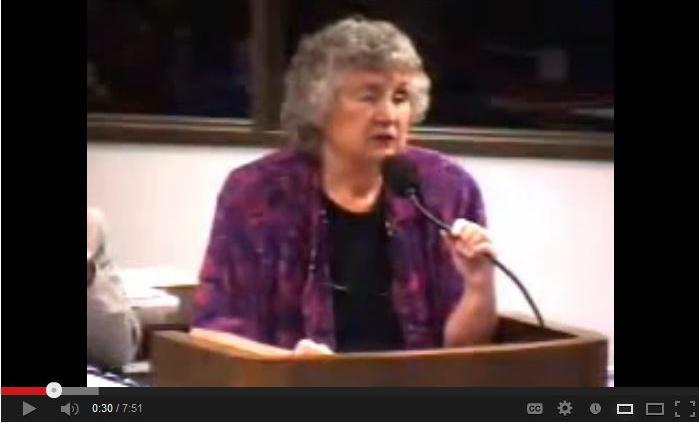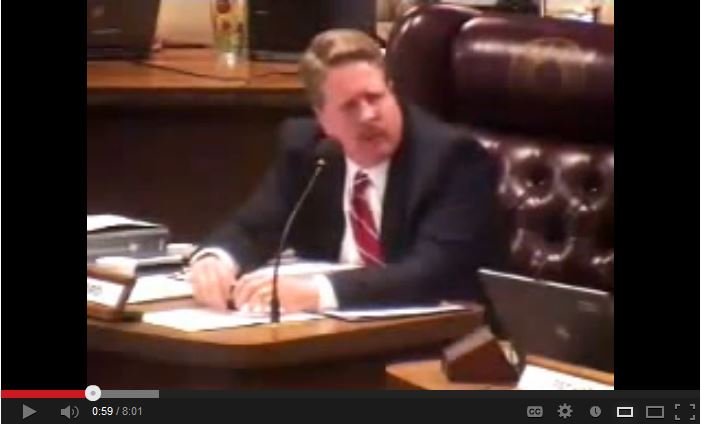Peaceful Vocations -
On April 19, 2013, Diane Wood, Peaceful Vocations member and representative of the Texas Coalition to Protect Student Privacy member, presented to the Texas State Board in Austin, TX the request that “Option 8” be the choice for all Texas schools when administering the ASVAB.
The Texas state organization, the Texas Coalition to Support Student Privacy, was initiated by Peaceful Vocations and formed in 2012. The purpose was to address the abysmal numbers of Texas students to whom the ASVAB is administered yearly. This group's formulation is an off-spring from the group formed by Pat Elder, the National Coalition to Protect Student Privacy. Three organizations in Texas have joined us in an action to address the issue regarding ASVAB to the Texas State Board of Education (see letter below). During the past year we launched a letter writing campaign to the Texas State Board of Education board members.
 |

This effort was also an excellent tool to provide education to the community and an opportunity for action. Parents and students have sent letters to various Texas State Board of Education members. Please contact us, if you would like to get involved at This email address is being protected from spambots. You need JavaScript enabled to view it. Read the letter submitted to the Texas State Board of Education below:
The Armed Services Vocational Aptitude Battery, (ASVAB) is the military's entrance exam that is given to fresh recruits to determine their aptitude for various military occupations. The test is also used as a recruiting tool in 833 high schools throughout Texas. During the 2010-2011 school year, the 4 hour test was used by military recruiting services to gain sensitive, personal information on 63,787 high school students, the vast majority of whom are under the age of 18. In high schools throughout Texas, the ASVAB is promoted without revealing its primary function as a recruitment tool. Students typically are given the test at school without parental knowledge or consent. The school-based ASVAB Career Exploration Program is among the military's most effective recruiting tools.
Nationally, 12,000 high schools across the country allow the military to administer the test to 652,000 high school students.
Teachers and administrators often remind students that educational records are highly confidential and that third-party access to that information is restricted. Based on this information alone, a student has a reasonable expectation that his school work will be kept private. In addition, the particular setting surrounding the actual administration of the ASVAB increases the student’s reasonable expectation of privacy. The ASVAB is administered on school grounds, during school hours, and by school officials, much like any other district- or state-mandated test. Based on this test-taking setting, a student reasonably expects that the ASVAB test results will not be released to unauthorized personnel. The Privacy Act Statement (release) lists six purposes for authorizing the disclosure of the test. Not one of these purposes mentions sending the scores to military recruiters. Although the Statement mentions that the test results will “establish eligibility for enlistment” (see DD Form 1304-5AS), this statement does not unequivocally provide that the results will be sent to military recruiters so that military recruiters can use these results as recruiting tools.
School counselors and administrators encourage students to take the test that many claim assists students in matching their abilities with certain career paths. The military advises school counselors to “emphasize to students that the ASVAB Career Exploration Program can give students an idea of their current interests, strengths and weaknesses, and help them learn about a wide range of careers regardless of their post-high school plans.” (ASVAB Counselor Manual at 14) Thus, students who take the ASVAB are led to believe that the purpose of the ASVAB is to help them identify their career interests; students are never told that the ASVAB scores will be sent to and used by military recruiters for recruiting purposes. Therefore, when school districts release the ASVAB scores to military recruiters, school districts are misusing information gathered for one purpose [to help students identify future career paths] in order to serve other purposes.
With respect to parents’ reasonable expectation of privacy, it is important to first recognize that parents entrust schools with their children’s personal information with the expectation that schools will safeguard the information collected about and from students. School Administrators are not expected to be family law experts. They are expected, however, to be sufficiently familiar with the laws to understand who may make educational decisions regarding children, who may have access to students, and who may have access to students’ records. This expectation of privacy is further bolstered by the notices parents receive from the school district at the beginning of each school year.
Pentagon data released through a series of Freedom of Information Act (FOIA) requests reveal that 15,805 students at 181 schools in Texas were required to take the test even though DOD regulations prohibit DOD personnel from suggesting to school officials that the test be made mandatory.
The military uses the exam to gather a treasure-trove of information to use in a sophisticated recruiting program. While the military tells schools that the function of the ASVAB is “to help students learn more about themselves and the world of work” (DOD Form 1304-5CM at 1 - “ASVAB Counselor Manual”5), Department of Defense (“DOD”) directives state that the purpose of the ASVAB is actually to “provide the Military Services with access to the high school market and recruiters with prequalified recruiting leads.” After the test is administered, military representatives meet with youth at school to discuss their scores and suggest career paths. Later, recruiters make calls to the students, using individualized profiles gathered from test data and other sources.
Federal and state laws strictly monitor the release of student information, but the military manages to circumvent these laws with the administration of the ASVAB. The Family Educational Rights Protection Act, FERPA, and Section 9528 of the Elementary and Secondary Education Act, ESEA, both contain requirements for opt-out notifications in releases of student information. Parents are given the right to stop their child’s personal information from being released to third parties, including the military, but there are no such requirements in the ASVAB student testing program.
Although military regulations allow schools to administer the test while precluding test results from automatically being sent to recruiters, few school administrators across the state are aware of the option. In fact, 85.3% of Texas' high school students of Texas' high school students who took the ASVAB had their test results forwarded to the Pentagon for recruitment purposes without parental consent and often without parental knowledge.
U.S. Military Entrance Processing Command (USMEPCOM) Regulation 601-4 identifies several options schools have regarding the administration and release of ASVAB information. These options range from Option 1, which permits test results and other student information to be released to military recruiters without prior consent, to Option 8, the only one that prevents test results from being used for recruiting purposes. Inaction on the part of a school will cause USMEPCOM to automatically select Option 1. Students and parents may not determine which release option is used; therefore they cannot opt out of releasing the information individually. See Page 3-2 of USMEPCOM 601-4. It is important to note that if a school chooses “Option 8” that the parent still may give permission for the test results to be released to military recruiters. The decision then rests with the parent, not the school.
It is also important to note that when students take the ASVAB, they must first sign a Privacy Act Statement. (DD Form 1304-5AS) If a student does not sign this form, then the student’s test will not be scored or processed. (601-4, 4-4.a.; see also DD Form 1304-5AS.) Although the military requires students to sign a Privacy Act Statement before their tests are scored and processed, ultimately schools – by exercising their right to select a Recruiter Release Option – control the release of students’ ASVAB test results to military recruiters.
In 2010 Maryland became the first state to enact a law that prohibits the automatic release of student information to military recruiters gathered as a result of the administration of the ASVAB. The Maryland law requires that each public school that administers the ASVAB shall choose “Option 8” as the reporting option for military recruiter contact to prohibit the general release of any student information to military recruiters. The law will ensure that the decision to share test results and accompanying private information with military recruiters rests solely in the hands of students and their parents
While Maryland is the first state to implement a law prohibiting the automatic release of student information gained through the administration of the ASVAB, Hawaii's Department of Education has implemented a statewide policy. New Hampshire's State Commissioner of Education has called for the statewide selection on Option 8. Many individual school districts, including those in Los Angeles, San Diego and New York City, have policies to the same effect. The California legislature passed a similar measure in 2008, but it was vetoed by the Governor.
The Texas Coalition to Protect Privacy organization advocates that the ASVAB Option 8 be the chosen option in all Texas schools, and that all administrative bodies in Texas schools receive information about the various options provided by the military.
Sincerely,
Diane Wood
Texas Coalition to Protect Student Privacy
Phone: 817-800-4249
The Texas Coalition to Protect Student Privacy is a member of the National Coalition to Protect Student PrivacyNational Coalition to Protect Student Privacy that works to prohibit the automatic release of student information to military recruiting services gathered through the administration of the Armed Services Vocational Aptitude Battery (ASVAB) Career Exploration Program in high schools across the country.
###
Revised 01/30/2022







